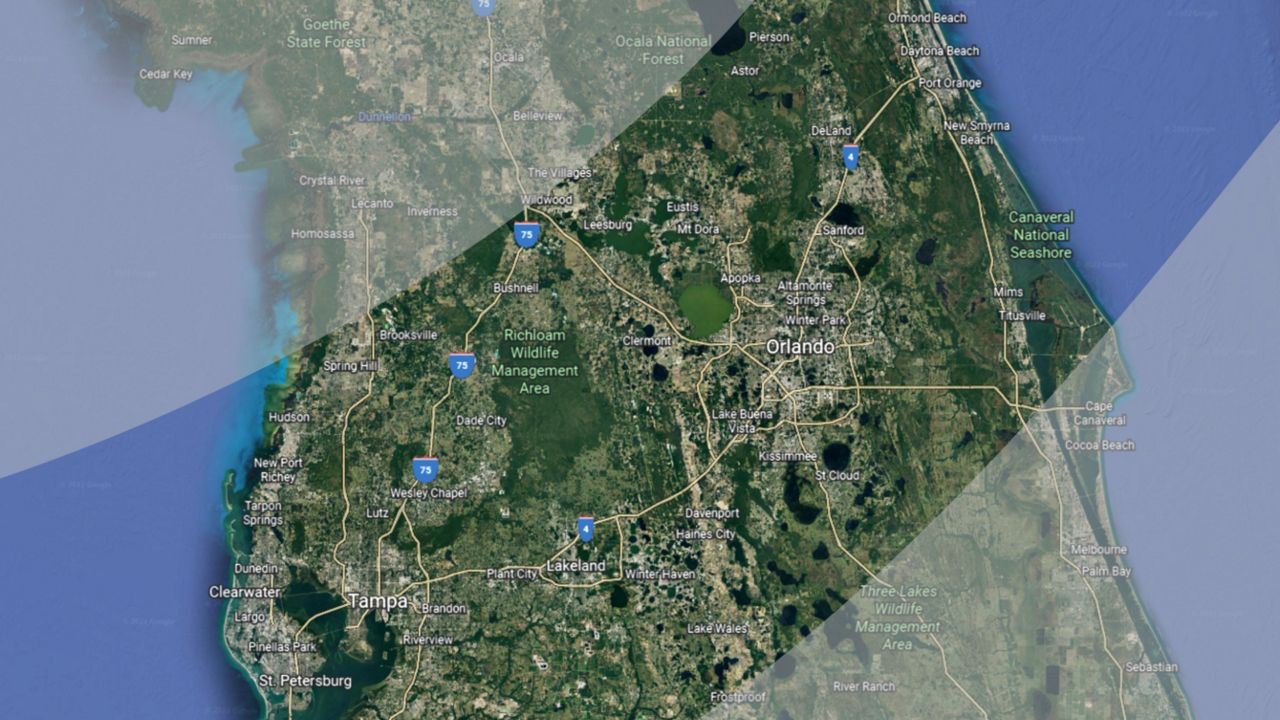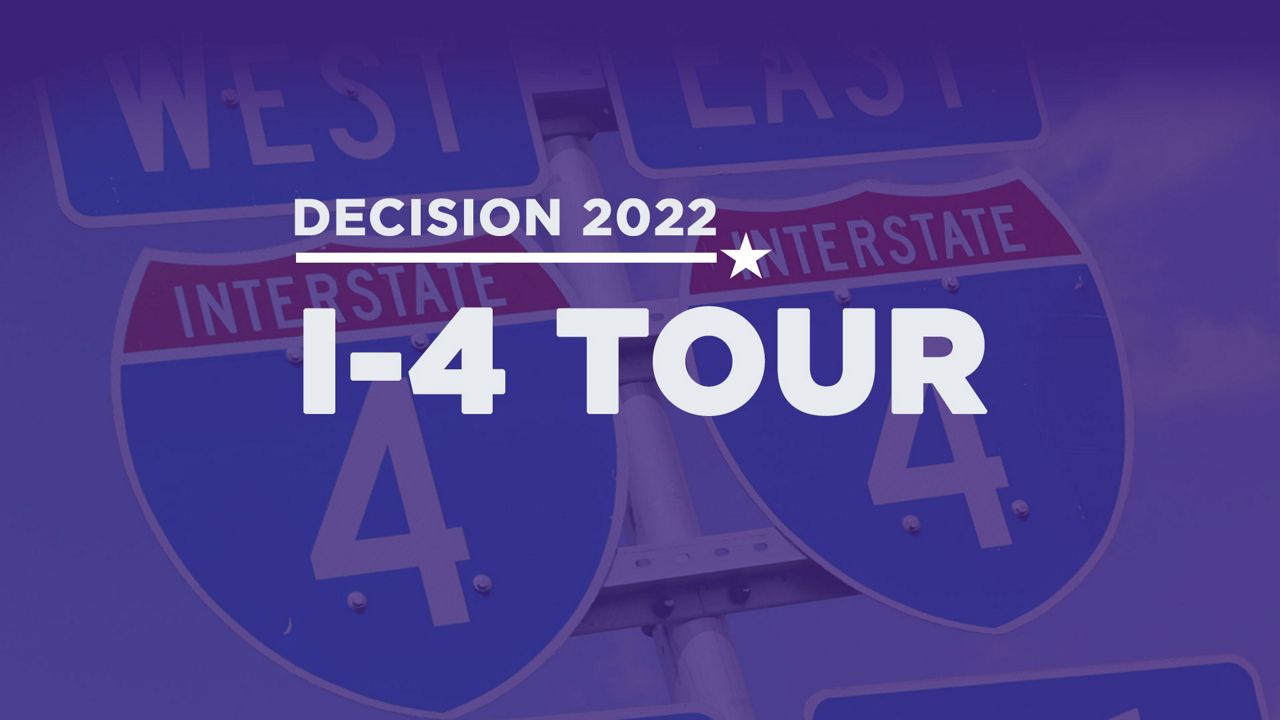Republicans dominate Tallahassee, and most of Florida’s electoral map is red, but bright blue Democratic population centers have kept the state — as a whole — reliably purple.
Sharp divisions between the parties and their supporters traditionally play out along our so-called “I-4 corridor,” where candidates for all levels of state and federal office focus lots of their time and money.
So, Spectrum News is talking to everyday people all along the interstate to find out how the biggest issues facing Florida and the country directly impact their lives — and their decisions at the ballot box.

Decision 2022
- Your personalized Voter Guide (Exclusively on the Spectrum News App)
- On desktop or mobile? Here's everything you need to know in Central Florida and the Tampa Bay area.
- Conversations with the Candidates
- Podcasts
Everything is more expensive
The cost of living an ordinary American life keeps rising, and voters up, down and across Florida’s I-4 corridor are feeling the financial pain.
Recent headlines of slowed inflation and down-from-record gas prices do little to lessen the everyday burden of squeezing outsized prices into already tight budgets. Any elected leader, left, right or center, will quote longtime Democratic consultant James Carville and tell you — when it comes time to fill in those little bubbles on the ballot — “It’s the economy, stupid.”
So, with Democrats controlling Congress and the White House, Republicans blame their opponents’ policies and proposals for all the economic stress. President Biden and members of his party counter fears of an impending recession by pointing to shining bright spots like strong job growth and a low unemployment rate
In Florida, Democrats up and down the ballot say Republicans won't do enough to help those struggling the most.
Of course, Gov. Ron DeSantis would strongly disagree and cite $450-per-child payments to nearly 59,000 Florida families participating in the Florida Temporary Assistance for Needy Families (TANF) program.
Meanwhile, small businesses in Central Florida and Tampa Bay that survived the worst of the pandemic are still paying the price — and passing some of those rising prices onto their customers.
Housing is simply unaffordable
You can’t discuss rising costs without factoring in Florida’s inflated housing market.
All along the I-4 corridor, around the state and just about everywhere in the U.S., rent and home prices remain through the roof.
And with no specific remedies coming out of Washington or Tallahassee, cities and counties are coming up with ways to stem the rising tide.
In the Democratic primary for Florida governor, Nikki Fried promises to “declare a housing state of emergency,” and Charlie Crist pledges to keep multi-billion dollar companies from driving up prices by gobbling up more real estate.
According to Apartment List, rent in the Tampa area spiked 27.6% since 2021, with a median one-bedroom price of $1,484.
In Orlando, renters have absorbed a 28.9% increase and are paying around $1,527 for a one-bedroom apartment.
While surging interest rates are slowing the housing market’s rapid inflation, Redfin reports Florida’s median home sale price is up 20.4% year over year.
For some of the many theme park workers across Central Florida and the Tampa Bay area struggling to cover their monthly expenses, direct political action has become a way to cope with the financial stress.
Insuring property is nearly impossible
It’s not all supply and demand.
The droves of people moving to Florida from other states may slow down a bit, and rising interest rates could turn the real estate market a lighter shade of red hot — but the mad grab for sunbaked homes isn’t the only reason renters are seeing astronomical price hikes.
Florida’s home insurance industry is in undeniable crisis, with the government-run “insurer of last resort” taking on record numbers of policies as private companies flee the state.
As a result, policy cancellation letters have piled up, and homeowners fortunate enough to stay covered face seemingly endless rate increases.
And, of course, a lot of cash-strapped tenants have found themselves footing those bills.
State lawmakers gathered in May for a special session and passed two laws, but critics argued the legislation didn’t do enough to address the urgent issue.
The professionals on the industry's front line say the problem remains far from solved.
Education is politically controversial
Property insurance isn’t the only hot topic in Tallahassee turning up the political heat across the I-4 corridor. Education legislation to ban a controversial curriculum from classrooms — and company boardrooms — fired up the rhetoric this year.
The Stop WOKE Act prohibits the teaching of Critical Race Theory, which asserts that racism and discrimination were built into America’s foundation and continue to exist within its modern institutions.
Charlie Crist opposes the ban but focuses his campaign platform more on staffing classrooms than addressing their lesson plans. He promises to “declare a teacher shortage emergency” and raise salaries.
Nikki Fried’s top education priorities include expanding Voluntary Pre-K (VPK), raising childcare teacher pay and growing enrollment in technical and trade schools.
Voters will also weigh Ron DeSantis’ handling of school safety and of COVID in the classroom when they choose to reelect him or cast their ballots for his eventual Democratic challenger.
And education has gotten increasing political at the local level, as well.
Florida is sharply divided over LGBTQ+ issues
Classroom concerns extend to questions of values along the I-4 corridor, as well.
Gov. Ron DeSantis faced a flurry of opposition this year for signing the Parental Rights in Education Act into law.
It bans discussions of gender identity and sexual orientation in the K-3 grade levels or “in a manner that is not age-appropriate or developmentally appropriate for students.”
The governors two potential Democratic challengers joined other critics in calling it the “Don’t Say Gay” bill and saying it discriminates against Florida’s LGBTQ+ teachers and students.
When The Walt Disney Company took a public stand against the legislation, the governor counterpunched and worked with state lawmakers to dissolve (effective next year) Reedy Creek, the improvement district through which Disney essentially governs itself.
Nikki Fried topped Charlie Crist in a quest for support from the Florida LGBTQ+ Democratic Caucus but not by enough to secure the group’s official endorsement in the primary.
Some LGBTQ+ voters say the candidates' stances — and the policies of those already in power — could impact their decision at the polls.
The environment matters to just about everyone
With exceptions, voters and elected officials across the political spectrum — and of course, all along the tourist-packed I-4 corridor — find ways to past their frequent disagreements when it comes to protecting our state’s natural environment.
Gov. DeSantis awarded more than $400 million in February for environmental projects statewide.
But, with the cost of living an ordinary American life becoming simply unaffordable for a growing number of Floridians, the longer-term concern about climate change isn’t driving much of the campaign conversation this year.
Still, in the race for governor, Charlie Crist’s platform calls for strengthening run-off regulations to combat algae blooms and swapping every septic tank in the state’s urban areas for sewer connections.
Nikki Fried calls for Florida’s Department of Environmental Protection to focus on mitigating the threats posed by dangerous chemicals and toxins like the ongoing situation at Piney Point.
Water isn’t the state's only environmental worry, though.
Conservationists are expressing grave concerns over the struggles of an insect that’s important to our delicate ecosystem — and to food supplies around the world.
For some Florida voters, a candidate's plan, or lack of a plan, to address the problem could directly affect their decisions on Election Day.




